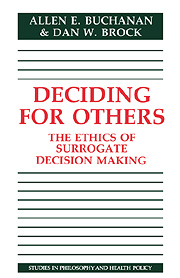Book contents
- Frontmatter
- Contents
- Preface
- Dedication
- Introduction
- Part one Theory
- Chapter 1 Competence and incompetence
- Chapter 2 The primary ethical framework: patient-centered principles
- Chapter 3 Advance directives, per son hood, and personal identity
- Chapter 4 Distributive justice and the incompetent
- Part two Application
- Looking forward
- Appendix one Living trust and nomination of conservatorship
- Appendix two Durable power of attorney for health care
- Notes
- Index
Chapter 2 - The primary ethical framework: patient-centered principles
Published online by Cambridge University Press: 05 June 2012
- Frontmatter
- Contents
- Preface
- Dedication
- Introduction
- Part one Theory
- Chapter 1 Competence and incompetence
- Chapter 2 The primary ethical framework: patient-centered principles
- Chapter 3 Advance directives, per son hood, and personal identity
- Chapter 4 Distributive justice and the incompetent
- Part two Application
- Looking forward
- Appendix one Living trust and nomination of conservatorship
- Appendix two Durable power of attorney for health care
- Notes
- Index
Summary
THE NEED FOR AN ETHICAL FRAMEWORK
Once it has been determined that an individual is incompetent to make all or some decisions of a given type, a number of perplexing ethical issues arise. The most obvious questions that must be answered are these: Who should decide for the incompetent? According to what principles should decisions be made? The issues are, however, considerably more complex than this. What is needed is a systematic ethical framework capable of distinguishing and answering not only these but other equally important questions as well. It is useful to think of such a framework as a theory of surrogate decision making—by “theory” we mean a coherent set of principles related to one another in a systematic way, and with sufficient power to resolve a wide range of important issues.
It is essential to distinguish among different types of elements that together constitute the needed theory. The most fundamental of these are the following:
Underlying ethical values: The basic ethical values that are to be served in dealing with incompetent individuals. These values are primarily: respect for individual selfdetermination, concern for the individual's well-being, and distributive justice. Of course, other important values, such as community and charity, are also sometimes relevant.
Guidance principles: Principals that provide substantive direction as to how decisions are to be made.
- Type
- Chapter
- Information
- Deciding for OthersThe Ethics of Surrogate Decision Making, pp. 87 - 151Publisher: Cambridge University PressPrint publication year: 1990
- 2
- Cited by



